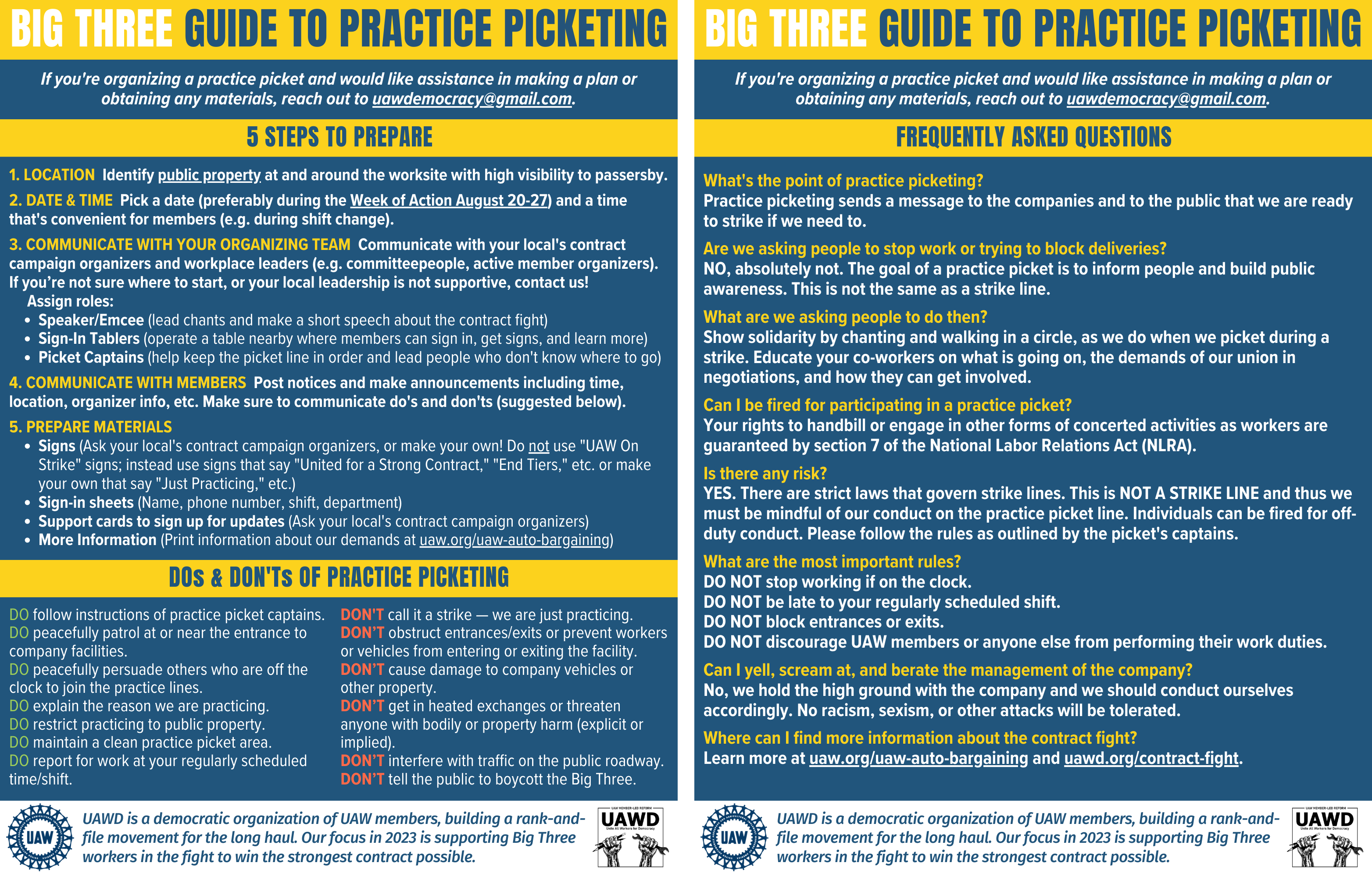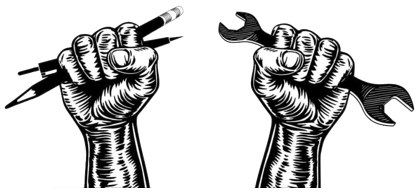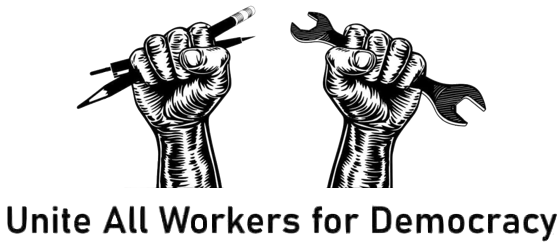BIG 3 GUIDE TO PRACTICE PICKETING
If you’re organizing a practice picket and would like assistance in making a plan or obtaining any materials, reach out to uawdemocracy@gmail.com.
WATCH OUR TRAINING ON PRACTICE PICKETING:
DOWNLOAD OUR GUIDE TO PRACTICE PICKETING:
(DOWNLOAD)

5 STEPS TO PREPARE
1. LOCATION: Identify public property at and around the worksite with high visibility to passersby.
2. DATE & TIME: Pick a date (preferably during the Week of Action August 20-27) and a time that’s convenient for members (e.g. during shift change).
3. COMMUNICATE WITH YOUR ORGANIZING TEAM: Communicate with your local’s contract campaign organizers and workplace leaders (e.g. committeepeople, active member organizers). If you’re not sure where to start, or your local leadership is not supportive, contact us!
Assign roles:
- Speaker/Emcee (lead chants and make a short speech about the contract fight)
- Sign-In Tablers (operate a table nearby where members can sign in, get signs, and learn more)
- Picket Captains (help keep the picket line in order and lead people who don’t know where to go)
4. COMMUNICATE WITH MEMBERS: Post notices and make announcements including time, location, organizer info, etc. Make sure to communicate do’s and don’ts (suggested below).
5. PREPARE MATERIALS:
- Signs (Ask your local’s contract campaign organizers, or make your own! Do not use “UAW On Strike” signs; instead use signs that say “United for a Strong Contract,” “End Tiers,” etc. or make your own that say “Just Practicing,” etc.)
- Sign-in sheets (Name, phone number, shift, department)
- Support cards to sign up for updates (Ask your local’s contract campaign organizers)
- More Information (Print information about our demands at uaw.org/uaw-auto-bargaining)
DOs AND DON’Ts OF PRACTICE PICKETING
DO follow instructions of practice picket captains.
DO peacefully patrol at or near the entrance to company facilities.
DO peacefully persuade others who are off the clock to join the practice lines.
DO explain the reason we are practicing.
DO restrict practicing to public property.
DO maintain a clean practice picket area.
DO report for work at your regularly scheduled time/shift.
DON’T call it a strike — we are just practicing.
DON’T obstruct entrances/exits or prevent workers or vehicles from entering or exiting the facility.
DON’T cause damage to company vehicles or other property.
DON’T get in heated exchanges or threaten anyone with bodily or property harm (explicit or implied).
DON’T interfere with traffic on the public roadway.
DON’T tell the public to boycott the Big Three.
WHEN SHOULD YOU HOLD YOUR MEETING?
Hold the meeting during a shift change, on break (unless your breaks are staggered) or lunch. Choose a time that will make it as easy as possible for people to show up. You may need to plan multiple meetings for different shifts. Promise that it will only be 10 minutes – and stick to it!
FREQUENTLY ASKED QUESTIONS
What’s the point of practice picketing?
Practice picketing sends a message to the companies and to the public that we are ready to strike if we need to.
Are we asking people to stop work or trying to block deliveries?
NO, absolutely not. The goal of a practice picket is to inform people and build public awareness. This is not the same as a strike line.
What are we asking people to do then?
Show solidarity by chanting and walking in a circle, as we do when we picket during a strike. Educate your co-workers on what is going on, the demands of our union in negotiations, and how they can get involved.
Can I be fired for participating in a practice picket?
Your rights to handbill or engage in other forms of concerted activities as workers are guaranteed by section 7 of the National Labor Relations Act (NLRA).
Is there any risk?
YES. There are strict laws that govern strike lines. This is NOT A STRIKE LINE and thus we must be mindful of our conduct on the practice picket line. Individuals can be fired for off-duty conduct. Please follow the rules as outlined by the picket’s captains.
What are the most important rules?
DO NOT stop working if on the clock.
DO NOT be late to your regularly scheduled shift.
DO NOT block entrances or exits.
DO NOT discourage UAW members or anyone else from performing their work duties.
Can I yell, scream at, and berate the management of the company?
No, we hold the high ground with the company and we should conduct ourselves accordingly. No racism, sexism, or other attacks will be tolerated.
Where can I find more information about the contract fight?
Learn more at uaw.org/uaw-auto-bargaining and uawd.org/contract-fight.
CONTACT US
uawdemocracy@gmail.com

